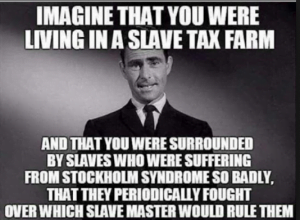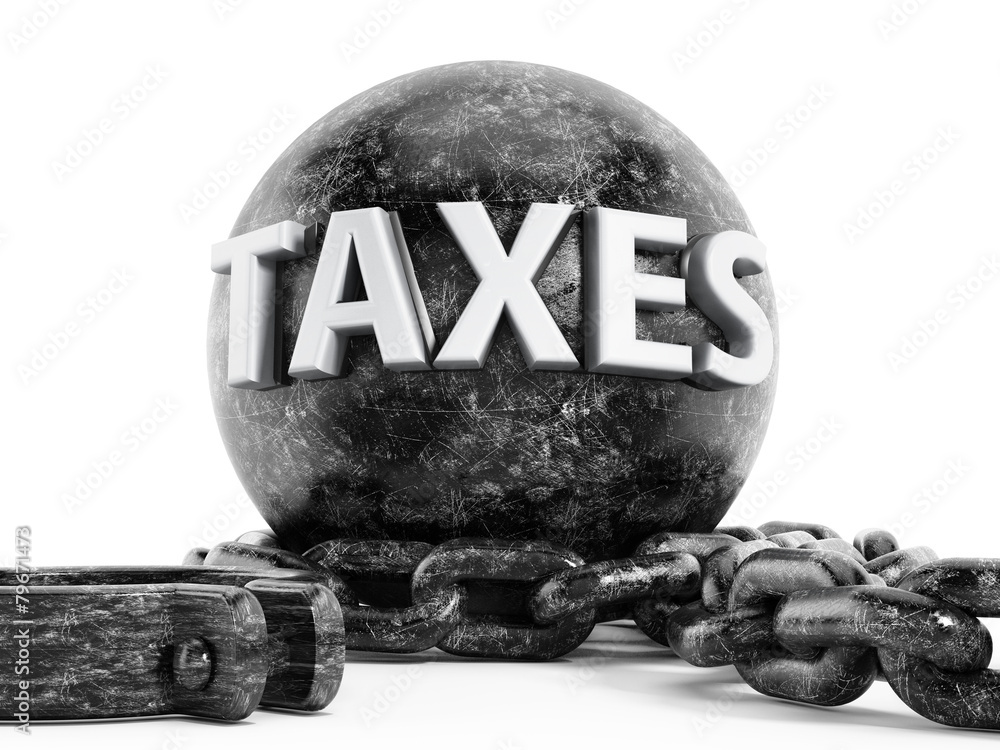This article was originally published by Jane L. Johnson at The Mises Institute.
No American politician running for office wants to talk about taxes—unless, of course, it’s to promise a tax cut. No Misesian views taxes with anything but suspicion, and Mises himself held some principled views on taxes:
Taxes are necessary. But the system of discriminatory taxation universally accepted under the misleading name of progressive taxation of income and inheritance is not a mode of taxation. It is rather a mode of disguised expropriation of successful capitalists and entrepreneurs.
It is important to remember that government interference always means either violent action or the threat of such action. The funds that a government spends for whatever purposes are levied by taxation. And taxes are paid because the taxpayers are afraid of offering resistance to the tax-gatherers. They know that any disobedience or resistance is hopeless. As long as this is the state of affairs, the government is able to collect the money that it wants to spend.
And America’s favorite quotable statesman Benjamin Franklin so aptly said in 1787, “….in this world nothing can be said to be certain, except death and taxes.”

The Diversity of U.S. Taxes
Americans currently pay a wide variety of federal taxes on earned income, investment income, estates, gifts, alcohol, tobacco, and tariffs on numerous imports. Americans also pay state and local taxes on real property, personal property, retail sales, alcohol, and tobacco.
No matter who becomes president in January 2025, Americans must be prepared for a great deal of heat—and perhaps some light—on taxes over the next year. At the top of the list will be former president Trump’s 2017 Tax Cut and Jobs Act (TCJA), the provisions of which expire in December 2025. Congress must grapple with calls to extend many of the law’s provisions as the country faces continuing large federal budget deficits. It is unclear how the new 119th Congress may deal with TCJA expiration, and what the U.S. tax code may look like after 2025.

Proposals for Other Kinds of Taxes or Credits
As if existing taxes were not enough, there is no shortage of other proposals, some of which could be considered marginally serious and some of which are outright fantasies unlikely ever to enter the American tax lexicon. Here are a few of these, in no particular order of sensibility versus fantasy:
- Former president Trump, if re-elected this year, has proposed significantly higher import tariffs, including a 10% across-the-board tariff on all imports into the U.S. He has alluded to tariffs high enough to replace the revenue generated by the federal income tax, citing William McKinley for his reliance on tariffs at a time when income taxes were unconstitutional. Whether the McKinley era (1897-1901) is comparable to today’s environment of much larger government is another matter.
- The former president has also proposed eliminating the tax on tip income, based on his conversation with a restaurant waitress in Las Vegas during his current campaign. While this idea may be a catchy populist campaign strategy, it is unclear what the federal tax revenue impact might be, or how many industries other than restaurants might shift their employee compensation from wages to tips if the latter are untaxed. Perhaps doctors and lawyers will begin to receive some of their income as voluntary tips. Despite these doubts, bills to exempt tip income from taxation were recently introduced in the U.S. House and Senate.
- And his vice presidential running mate Vance suggests higher taxes for childless taxpayers, which is effectively already the case with the Child Tax Credit for those with qualifying children. This credit has been available since 1997, and fifteen states also offer variants of it. Eligibility for the credits has changed over the years, and these credits will almost certainly be under discussion again this year.
- The Fair Tax was first introduced in Congress in 1999, revived again most recently in January 2023 as HR 25, and remains in the House Ways and Means Committee. This legislation would replace the federal individual income tax, corporate income tax, payroll taxes, and the estate and gift tax with a national retail sale tax levied at the point of final sale on all goods and services, including those provided by the government itself. The legislation would also abolish the IRS because all taxes would be collected by state governments and forwarded to the federal government. The initial sales tax rate would be 30%, taxing $30 on a $100 purchase for a final tax-inclusive price of $130. As the bill proposes, however, the net tax rate is only 23%, calculated as $30 divided by $130. Traditional state sales taxes are applied to the shelf price of a good or service on a tax-exclusive basis, rendering tax rate comparisons deceptive.
- The Flat Tax was first proposed in 1981 by two economists writing on the editorial page of the Wall Street Journal. The original plan would give each family a large exemption, would tax all wage income above that level at a single low rate, and exempt investment income from all household-level taxes. Proponents assert that this plan would increase savings and economic growth by raising the after-tax return on savings, although skeptics are doubtful. The concept inspired some U.S. states and foreign governments to adopt flat-tax systems, though it never reached the U.S. Congress for discussion or a vote.
- Wealth taxes appeal to those on the left end of the political spectrum for their presumed ability to extract taxes from Americans with higher levels of income and wealth. Questions arise, however, as to how these taxes might be administered, whether they would in fact raise much tax revenue, and if they may encourage wealthy individuals to leave the U.S. Some countries that have implemented wealth taxes have later repealed them for these reasons.
Looking Ahead on the Tax and Spending Front
Despite the consensus that the U.S. has a spending problem, not a taxing problem, the federal government will continue to search for revenue in the face of continuing federal budget deficits and increasing debt. Interest on the federal debt annually totals about $1 trillion, consuming 39% of individual income taxes paid.
Other tax proposals sit on the horizon. Global warming virtue signalers advocate carbon taxes. Others on the left end of the political spectrum lobby for more progressive taxes in order to fund their favored income and wealth redistribution schemes. Costly new programs such as Universal Basic Income (UBI) and reparations, two novel forms of entitlements, would greatly increase the need for additional tax revenue and/or require significantly larger amounts of federal debt. The same is true of calls from the populist right for increased middle-class benefits such as increased child tax credits and earned income credits.
Though the two major political parties offer very different policy prescriptions in the upcoming presidential election, both appear to result in increased Treasury debt issuance and federal budget deficits, which could exacerbate inflation and threaten bond markets.
Thus, one can predict continuing voter inability to face large continuing federal budget deficits and accumulating debt that now runs at about 100% of GDP; to face insolvency in the Social Security, Medicare, and highway trust funds; and to face the lack of consensus on measures to reduce spending and increase tax revenues.
The obvious question then becomes how tolerant Americans are of additional tax and debt burdens on current and future generations before responding with a change in political and economic trajectory. Such an inflection point has, however, not yet appeared on the horizon.
EDITOR’S NOTE: Taxation is theft, and government is slavery. Isn’t it interesting that a bunch of wealthy sociopaths spend so much of their time devising ways to steal from those who rightly earned their income? Americans have become very tolerant of their enslavement and not enough people understand what is going on yet. Hopefully, it is only a matter of time. Taxes are only necessary if you believe someone has the right to take from you and you believe in someone else right to rule or own you. If you own yourself, you own the fruits of your labor. Anything less is abject slavery. Time to wake up and break free. Watch the video below:










0 Comments